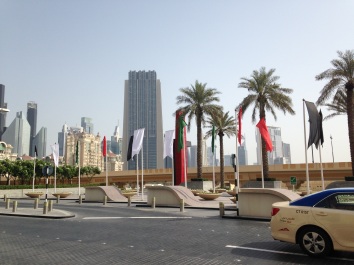This past weekend, I traveled to Chicago to visit three of my high school friends who now live there. When I landed back in New York on Sunday night at LaGuardia Airport, I was happily expecting my parents to pick me up. But I received a text from my mom saying that I should take a cab home, because traffic was backed up for miles and it would be impossible for them to get me.
Upset and frustrated, because usually a cab from the airport to Westchester needs to be reserved in advance, and is excessively expensive, I grudgingly got in a yellow cab. I told the driver, “Mamaroneck. It’s in Westchester.”
With his thick accent, of which I couldn’t make out at the time, he told me he didn’t know how to get there, how much it would cost, or how long it would take. With his broken English he asked, “So I take the LIE?”
Annoyed, I bitterly snapped the directions back to him. And he was nothing but sweet, apologizing for his imperfect English.
I’m ashamed now that I took my initial aggravation out on him. I wish at the time, I could have separated my frustration towards the traffic, and my appreciation towards the driver willing to bring me home.
About 15 minutes into the drive, I calmed down and realized that my rudeness was disrespectful and unnecessary. We started talking about the traffic, and how he would try to find another route to get back to the airport to pick up yet another passenger, instead of the one that remained at a stand still.
And then I asked him where he was from.
“I don’t want to tell you, you’ll hop out of the cab,” he said.
He is from Guinea; he left his family and came to America nine years ago. His family: his sisters, his mother, his cousins, his uncles and his aunts, who are all still there, are all healthy, and doing well.
Though he said it with a giggle, it wasn’t a joke; he really did fear that I would think his mere existence, as a man from Guinea, posed a threat. It’s sad that many do feel this way.
Like HIV, Ebola has gathered a stigma of its own, that’s spreading as rapidly as the virus itself.
Many are incapable of seeing Ebola for what it is, a horrible and painful virus that can infect anyone only through bodily fluids; instead, they see it as a marker of West Africans, and as a reason to shun anyone from there.
In attempt to reduce the associated stigma, President Obama and Dr. Anthony Fauci, director of the National Institute of Allergy and Infectious Diseases, embraced Nina Pham, the nurse who survived Ebola, in a hug last week. Pham contracted the virus while treating the now-deceased Thomas Eric Duncan, the first Ebola patient to be on U.S. soil, at Texas Health Presbyterian Hospital in Dallas.
About an hour later, I was finally home. I grabbed my luggage, handed him a tip, thanked him, and then shook his hand.



